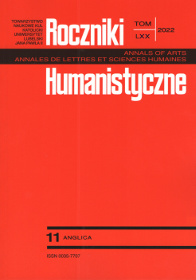The Child and the Anthropocene: A Time Travel Narrative as a Means to Empower Children in the Face of a Global Pandemic
The Child and the Anthropocene: A Time Travel Narrative as a Means to Empower Children in the Face of a Global Pandemic
Author(s): Edward ColerickSubject(s): Language and Literature Studies, Studies of Literature, British Literature
Published by: Towarzystwo Naukowe KUL & Katolicki Uniwersytet Lubelski Jana Pawła II
Keywords: children; family empowerment; Anthropocene; pandemic; technology; initialisms
Summary/Abstract: The following article looks at a contemporary children’s time travel story, The Dog Who Saved the World by Ross Welford, written and published just at the very outset of the COVID-19 epidemic. The novel is itself about an even more potentially dangerous epidemic which might have serious consequences in the near future for the whole of humanity. The author skilfully uses the narrative in order to include the child reader by replicating the mood and atmosphere of the current pandemic, thus, effectively empowering them against it. To achieve this, the author foregrounds what he considers to be “good” as opposed to “bad” technology and enables the child to comfortably deal with its complexities along with the complexity of time travel through scientific initialisms and other forms of abbreviation which children are highly familiar with (texting friends on smartphones or using the social media).
Journal: Roczniki Humanistyczne
- Issue Year: 70/2022
- Issue No: 11
- Page Range: 21-36
- Page Count: 16
- Language: English

